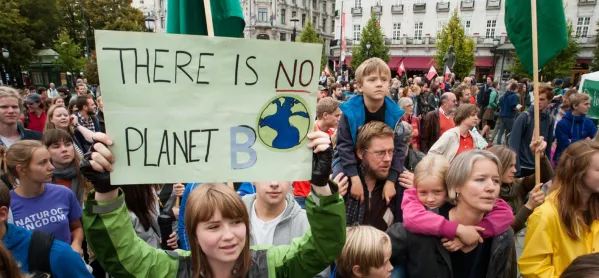- Home
- Why isn’t climate change at the centre of curricula?
Why isn’t climate change at the centre of curricula?

This month, Italy became the first country in the world to make climate breakdown a central pillar of their education system.
All Italian state schools will be required to teach climate change or sustainability for 33 hours a year. And sustainability and climate have been made the centre of the education model, according to Italy’s education minister.
At the same time, Britain is reckoning with its climate future.
Youth climate strikers and Extinction Rebellion have transformed public opinion. And, this week, the general secretary of the Association of School and College Leaders called for climate change to be given more space in the curriculum. The question is not if we can decarbonise, but when.
Schools should be crucial to this dramatic transition. But, a recent survey, commissioned by Oxfam, showed that three-quarters of teachers felt unprepared to educate students on climate breakdown. Sixty-nine per cent said that they still needed more training.
Subject integration
Rather than simply dedicating more time to climate change in the curriculum, it might make more sense to support teachers through CPD, to integrate climate literacy into their existing subjects.
How often is the 1901 D’arcy Concession, a British-Persian oil deal which was of “global significance on a par with Columbus’s transatlantic discovery of 1492”, according to Peter Frankopan’s book The Silk Roads, included in teaching about the British empire?
How often do students study climate poetry, or learn about entropy in economics?
The first step for the education system is to recognise that climate breakdown is not just an environmental issue. It is also one of the most important social, economic and foreign policy issues we face. Teachers should be supported to build the school curriculum with that in mind.
Lifelong climate education
A systematic approach, as seen in Italy, is essential. School climate strikers and the National Union of Students have already called on the government to implement a Climate Emergency Education Act, including introducing an understanding of the climate emergency.
Initial teacher training and inspection frameworks could also be reformed.
On top of this, there needs to be a coherent climate curriculum from early years through to adulthood.
We need to ensure that all students understand principles such as feedback loops and the relationship between carbon emissions and atmospheric carbon dioxide, and can explain causation in complex systems.
Germany and Japan already have a comprehensive approach to incrementally building the skills and knowledge about climate change that are now surely needed to participate fully in democracy.
Models of a carbon-free future
Places of learning need to become models of a carbon-free future. Schools currently produce 2 per cent of UK emissions. Building design, energy use and teacher practices should now be understood as critical to influencing student norms.
Groundbreaking work is being done already by organisations such as the Green Schools Project and Less CO2, and by several pioneering schools. Inviting students to actively participate in reducing school emissions ingrains citizenship, by building the practical knowledge to deal with climate breakdown collectively.
We will need new skills to carry out this deep change to our economy. One in 10 workers may have to reskill in order to retrofit homes, build solar panels and move away from carbon-intensive industries.
The ability to learn new skills is already crucial in an economy of increasingly short-term jobs, rather than long-term careers.
A recent report also suggested that energy companies should actively work with schools, to promote interdisciplinary Stem education in schools. This could prevent engineering graduates from leaving the industry.
A democratic right
Climate breakdown is complex, and misinformation is rife. Comprehensive climate education from cradle to grave must therefore be seen as a democratic right for all citizens.
Surrey and Bristol universities already provide free optional climate courses for students. There should be education available for people of all ages and educational status, to build capacity for community-level social dialogue. This kind of dialogue has been critical in transitions away from fossil fuels in other countries, such as Denmark.
Climate breakdown is the fight of our lives. Everyone deserves a seat at the table to envision our collective future.
Philip Bell is a secondary humanities teacher in London
Keep reading for just £1 per month
You've reached your limit of free articles this month. Subscribe for £1 per month for three months and get:
- Unlimited access to all Tes magazine content
- Exclusive subscriber-only stories
- Award-winning email newsletters